|
Nick Land is a British philosopher living in Shanghai. Nick is one of the main figures in the school of thought known as accelerationism. He is currently writing a book about the philosophical implications of Bitcoin. We talked about accelerationism, cybernetics, ideology, the evolution of Nick’s perspective, Deleuze and Guattari, emancipation and dehumanization, artificial intelligence, capitalism, Moldbug, mathematics and the significance of zero, religion, blockchain/Bitcoin, Kantianism, synthetic time, and more.
We recorded this online, over two sessions. We did have some unavoidable connection problems, so you'll notice some imperfections such as clicking sounds throughout. We did the best we could; big thanks to those who helped with the editing.
Listen the audio below:
Part 1: Acceleration, Ideology, Intelligence, Religion
Justin Murphy: You’re basically one of the leading thinkers, I would say arguably the leading thinker, of what we might call the school of thought that’s known as accelerationism. Accelerationism is something like the view that contemporary history is changing at an exponential rate, technologically and economically, and that this rate of change confounds nearly all of our traditional concepts for thinking about society and economics and politics. That’s just for people who have no idea what we’re going to be talking about, that’s broadly the school of thought you are known for and associated with, so maybe just before we even move forward (that’s my short, “elevator pitch” as it were), would you add anything to that? If someone on the street walked up to you and asked you “What is this whole accelerationism thing?” Is there a kind of essence or key upshot that you would add to what I just said?
Nick Land: We’re going to have this conversation so, you know, it’s probably … to try and anticipate might be a mistake, and I think as we start talking about it, we will find ourselves in various dimensions of accelerationism. In terms of my own involvement in it, I would say the guiding term, for certainly a long time, was cybernetics. The basic accelerationist thesis is that modernity is dominated by positive feedback processes rather than negative feedback processes, and the first wave of cybernetic theory — which consistently normalized negative homeostatic feedback and pathologized positive feedback — was therefore self-obsolescent. It was something that was not going to be a sustainable stance, given the — as you say — basic accelerating trend of the modern process, most extremely in its technological and economic dimensions. So that’s the “off the shelf” conceptual vocabulary that I think, at least initially, it comes in with, but it is itself extremely dynamic. And we’ve seen, an astounding range of different systems and terms of reference get sucked into this accelerationism conversation. Justin Murphy: I’ve always been extremely curious about the relationship between your earlier work and your current thinking on these matters. A lot of your early work from the 1990s, it tends to embrace a fairly radical and even emancipatory political tone, I think it’s fair to say … it’s very kind of insurrectionary anarchist. There are a lot of feminist connotations. It’s very cyberpunk, obviously. It’s all about theorizing rebellion in the new digital context. Things like “hacking the macropod” and exploiting glitches in what you call the “human security system”, these sorts of notions … You talk about “k-war,” which I interpret as like revolutionary guerrilla warfare but on the level of the social codes. You’re even interested in more fantastic ideas such as stuff like “neolemurian time-war” in which one gets the sense that your position then seems to have been that these sorts of accelerationist insights might allow rebellious individuals and groups to fundamentally alter or hack the nature of social reality in ways that the status quo institutions are not able to defend against … There’s this very heady, emancipatory kind of tone to all of it, and so a lot of people who are interested in your work and your ideas, got into it through these early texts, and I think we know it’s very clear that since then, your thinking has evolved drastically, but what’s unclear I think is how and why exactly your thinking has changed or just how to understand the trajectory between those early heady, emancipatory connotations and your current viewpoints. So before even going into your current views and picking your brain about how you see these things today, I’m just curious if you could kind of mentally go back to the 1990s, when you’re theorizing all these kinds of radical ideas at the beginning. What was the first crack in that tendency for you? Like what gave, exactly? Was there a particular realization or insight or problem or anomaly in your viewpoint in the 90s that kind of cracked and made you see that all of these radical emancipatory ideas are not going to work, or how would you explain that? Nick Land: These things come in waves. Wave motion is crucial to this. There was an extremely exciting wave that was ridden by the Ccru in the early to mid-1990s. You know, the internet basically arrived in those years, there were all kinds of things going on culturally and technologically and economically that were extremely exciting and that just carried this accelerationist current and made it extremely, immediately plausible and convincing to people. Outrageous perhaps, but definitely convincing. It was followed — and I wouldn’t want to put specific dates on this, really — but I think there was an epoch of deep disillusionment. I’d call it the Facebook era, and obviously, for anyone who’s coming in any way out of Deleuze and Guattari, for something called “Facebook” to be the dominant representative of cyberspace is just almost, you know, a comically horrible thing to happen! [Laughs.] I just really responded to this with such utter, prolonged disgust that a certain deep, sedimentary layer of profound grumpiness — from a personal point of view — was added to this. But I don’t think it’s just a personal thing. I think that accelerationism just went into massive eclipse …
A full-text transcript with timestamps is available at:
0 Comments
Nick Land - Time Spiral: On Templexity, Looper, Architecture and Shangai/China (with Q&A) - audio7/3/2018
A presentation at the All Tomorrow’s Parties: Shanghai Futurism event, going over more or less a gloss of his short book/essay Templexity: Disordered Loops through Shanghai Time. An edited version of said talk, trimmed out Jeff Wasserstrom's talk and Q&A responses as well as the Chinese live transliteration.
Listen the presentation below:
Payday
NOTE:Timing based on Payday archives. Nov.22/2014 1178054-6-1 (Part 15 at 37:12 and Part 16 at beginning [finished playing]) obsolete museums touching the artifact Expo'67 8:25 the young McLuhan fatigued by museums 8:45 New York's natural "discontinuous space" 9:40 detective stories 12:30 making a room like a pinball machine 14:10 Bucky Fuller dome 15:45 and 18:45 Ted Carpenter's Eskimo researches 16:20 "The Electric Circus" 21:20 McLuhan's tetrad-management 21:50 McLuhan never heard about New York "flats" 23:30 Gerd Stern???? 24:40 Eskimo doesn't get vertigo 29:30 Electronic music 30:05 Tony's "acoustic museum" 32:50
taken from:
Prophet and leading philosopher of the electronic age Marshall McLuhan was born in Edmonton in 1911. He studied English at the University of Manitoba and at Cambridge before becoming a professor himself, positioning himself as a star academic, writer and speaker at the University of Toronto, where he remained until 1979.
McLuhan pondered the nature of the electronic world and was the first to discuss the relationship between humans and the media – computers, televisions, radios and advertisements – that surround us. In fact it was McLuhan who coined the term ‘media’. He published several books, his most widely-read study being Understanding Media: The Extensions of Man (1964), where he proposed that the media themselves, not the content, should be the focus of intellectual attention – a thought which prompted the famous McLuhan phrase: the medium is the message. Decades ahead of his time, McLuhan’s numerous analyses of media and their effects are still pertinent today, particularly as we become increasingly engulfed by the digital age.
Nov.8/2014 1177790 July 6/66 TV Panel on MM (Harold Rosenberg, Richard Schickel, Tom Wolfe)
(Part 13 at 24:47 and Part 14 at 5:09)
taken from:
Barbara Walters
Payday
NOTE:Timing based on Payday archives. Oct.25/2014 1177319 (Part 12 at 52:32 and beginning of Part 13) advertising, "I'm an explorer, no point of view", Montaigne and newspapers, Bucky Fuller as solution, education, school as guerrilla units
the record below:
Marshall McLuhan & John Culkin at Fordham, 1967.
Payday
NOTE:Timing based on Payday archives. Oct.4/2014 1177319-5-1 (same as 1177319-7-1) (Part 12 at 13:43) coming TV of laser beams (no picture frame) 2:39 Culkin coined the "fish" metaphor FW and 10 Thunders (10th Thunder is TV [post-history], 7th is radio, 8th is movie, movie and TV [not fantasy]/car and plane ["Ondt and Gracehoper"]) 5:51 Garden of Eden 13:29 (see 27:08 of Part 12 on Oct.4) - will hijack a lot of money from the Foundations gardens are machines 15:41 virtual reality in consciousness 17:54 black and white sound vs. film and radio (the Russians) 20:34 democracies become aristocracies 32:07 waltz vs. watusi 33:18 Lewis Carroll vs. Einstein (see FW) 33:57 "conformity" as rearview mirror 34:58 movie as a "parahodos" (parody of Life) (Valery's comment) 36:17 predicts the Internet 37:02 iON's "obsolescing and retrieving" 37:45 2-bit wit of the computer 37:55 newspaper explains "Dada" 39:02 formal causality 40:29 instruction/stenciling on brainpan vs. exploration/probing (myth/fallacy/pattern-recognition [pattern that structures]) 42:03 Joyce's ULYSSES mimes the retrieval of the involving Homeric gestalt/orality 43:05 Edmund Burke on value judgments and entire populations 44:45 "empathic" understanding of process 45:30 Oct.11/2014 1177319-5-2 (continuing Oct.4 1177319-5-1) (Part 13 at 53:55) obsession with the Past/History/Rearview Mirror (alienation from the Present) Hamlet the Revenger :24 Milton's "Paradise Lost" (retrieves the Garden of Eden) :56 Graveyard School of Poetry (the dead Present served as a parody of the "Past" trend) 1:25 Landscape Poetry of the Romantics (Nature used as a mirror for the mind of Man, not the Past - liberated from "History") 1:44 going from the Unknown to the Known (the Gorgon without a mirror) 2:17 Pop Art regards the environment itself as art form 3:00 Art as "prediction" not "proof" 3:36 Edgar Allan Poe (retrace by reversing) 4:23 Gerry Fagan said "the future of the future is the Present" 4:44 artist uses his senses as scientific instruments (a critique of satisfaction) 5:15 15-year-old Elizabeth McLuhan on a probing high school (Grade 11) team about education 5:36 rigged quiz shows 6:08 Hawthorn Experiment near Chicago 6:53 merging work, learning, and discovery releases tremendous energy 7:45 his "probing" is explained 8:34 holding his microphone 8:46 Oct.11/2014 1177319-5-2 (continuing Oct.4 1177319-5-1) (Part 14 at 8:19) Oct.18/2014 1177319-3-1 (continuing Oct.11/2014 1177319-5-2): (Part 13 at 9:01 [short excerpt with section that precedes 1177319-5-2]) Cardinal Newman's "university" (the city) 9:40 Garden of Eden 11:46
taken from:
Oct.18/2014 1177247-5-1
(Part 16 at 12:26) **Ralph Baldwin on "media ecology" 13:58 "reorientation and awakening" 20:56 hot and cold media ("help" vs. "fire!") 21:00 FW (movie [fantasy] and TV [young are grim and serious] [Thunders 9 {Ondt and Gracehoper} and 10 {television} {applause}]) 23:17 Seurat and Rouault (light on and light through/rear projection) (making process for the audience in Poe and the Symbolists) (data/form [hot photo and movie] vs. information/structure [cool TV]) 30:52 media ecology/discovery is for HCE 35:09 black and white sound (much gradation and modulation, foreground and background) 36:21 postmodern MM 39:23 protecting the underwater landscape 40:26 DeGaulle joke 40:40 "stream of consciousness" (film's effect on prose/see "Prufrock" and the involving, syncopated "Blues" [abrupt encounter of forms]) 41:52 Alex Leighton ("to the blind all things are sudden") (ancient seer and insights) 45:24 effects of the tape recorder (John Cage) and photograph 46:20 programming the human environment 48:05 "wild track" (history of art forms) 48:44 Earth will be considered our origin 49:59 the effects of radio being put around film (dwelled more on the shot ["Dr. Zhivago", Fellini and Bergman], the shot became inclusive [see FW] as in cartoon and TV, the "thing"/research novel and interest in raw data and facts among the young [going Oriental], the existentialists and the new mood [LSD scrubs off "the tape of personal awareness"]) 50:57 McLuhan calls his lecture a "tour" 58:41 the movie as a repeat of ordinary life ("parahodos", prose Realism, and "the great age of satire" [Pepys and Defoe]) 58:50 Oct.18/2014 1177247-5-2 (Part 17 at beginning for 54 seconds [completing Part 16 and then a longer section of this end of Part 16 is repeated at 24:05] and then at 27:05) Paul Valery (Symbolist poet) quotation on the movie as a form of mechanical, visual, memory storage (which points to the more comprehensive computer storage) 27:11 "entropic" electric circuitry (the safety car is entropic/turning inward) 28:04 movie as, at first, iconic and then to the "rise of the visual" (high definition [hi-fi]) ("psychosomatic effects") 29:11 Innis, Havelock, and Barfield (visual effect of phonetic literacy) 30:03 McLuhan says "the medium as the message/massage" 31:06 McLuhan repeats "Joyce's ULYSSES mimes the retrieval of the involving Homeric gestalt/orality" from Oct.4 ("complicated issues") 31:24 the artist (play) vs. writing out your tax form (work) 2:28 children are geniuses until age five or six 33:00 McLuhan describes "media ecology" 33:18 Aristotle on plot in the "Poetics" vs. the episodic 33:37 McLuhan on the non-visual "coincidental" (overlaying) 34:05 manuscript as "tapestry" ("textura") 35:14 silent reading and grammar vs. slang 35:46 the inauguration of the "Rearview Mirror" (repeated the next day at Fordham) (Garden of Eden mentioned at 38:04) (climaxes with photo and film) 36:43 Victorian novels all begin back 30 or 40 years before the publication date of the book (Scott and Dickens, etc.) 39:21 photo Realism evoked the turn toward structural forms (heuristic probing, discovery, and prediction as opposed to a wrap-around "comfortable dreamworld" and "proof" [rearview mirror]) in the arts ("Madame Bovary") (Art and Science joined hands) (Joseph Conrad and Flaubert's "Sentimental Education" boast on the Franco-Prussian War) 40:05 Pop Art (comics, etc., are "avant-garde" in their "artistic mode") 42:51 Dickens and Dostoevsky, Poe and Baudelaire (gangster/cowboy movies, the Beatles, and Chaplin made playfully outside of the studio) ("putting on" the public) 43:32 Question Period begins 46:05 Fragonard, Boucher, and Mozart 47:15 McLuhan says he is not an expert 48:35 people are anarchists perceptually (only trained faintly in books) (Gurdjieffian somnambulism) 49:07 environmental "volapuk" (see FW) 51:19 "psychosomatic" torture 51:42 studying media "like a surgeon" 52:29 anaesthesia's horrors 52:41 no movie effect when on TV 52:58 McLuhan chides the questioner for "giving up too early" 54:19 the need for gestalts/pattern-recognition ("which we all do") at very high speeds (McLuhan mentions speed-reading) (the newspaper as a Surrealist poem or "happening" [no story-line, just a date]) 55:05 listen the audio below: Payday NOTE:Timing based on Payday archives. Jan.24/2015 1177118-7-1 June/66 with Tony Schwartz: (Part 19 at 32:42) accepting the world as a recording studio means the environment is an art form (due to "the net of electric information") 32:42 McLuhan explains Pop Art ("we then suddenly become tremendously self-conscious of all sounds and effects of that environment as if it were a work of Art") 33:25 McLuhan then reads various short statements on: humor, Art, and games 34:00 more on games, golf, and Art 35:45 "Rocket" Richard, games, industrial cultures, and Art 38:25 the "newspaper game", bad news explained, and the British and Americans 40:51 "the medium is the massage", games, boxing, and wrestling 43:22 "Help!" vs "Fire!" 44:54 more on humor, fun and play 46:47 SPORTS ILLUSTRATED and TV 47:07 paradoxical reversals leading to "growing up" as our main job 48:28 the entire world's population can live in Manitoba, "population explosion", Black Hole of Calcutta, "infinite mass" and wars, and nose counting vs. "creatures of mood" (a block of color as in my Tiny Note Chart), "Playback" (focus groups) vs. cancer research, McLuhan is not FOR what he talks about, judging becomes an outer activity, end of capital punishment (HCE is guilty), the Uncertainty Principle 49:47 consciousness as process 56:31 Jan.24/2015 1177117-3-1 June/66 Miscellaneous fragments edited by Tony Schwartz: (Part 20 at 2:41)
artwork by Charles Gatewood tattoo Mike made of Bromsilver
Doctor “Fingers” Schafer, the Lobotomy Kid, rises and turns on the Conferents the cold blue blast of his gaze:
“Gentlemen, the human nervous system can be reduced to a compact and abbreviated spinal column. The brain, front, middle and rear must follow the ade-noid, the wisdom tooth, the appendix…. I give you my Master Work: The Complete All American De-anxietixed Man….” Blast of trumpets: The Man is carried in naked by two Negro Bearers who drop him on the platform with bestial, sneering brutality…. The Man wriggles…. His flesh turns to viscid, transparent jelly that drifts away in green mist, unveiling a monster black centipede. Waves of unknown stench fill the room, searing the lungs, grabbing the stomach…. Schafer wrings his hands sobbing: “Clarence! How can you do this to me?? Ingrates!! Every one of them ingrates!’ The Conferents start back muttering in dismay: “I’m afraid Schafer has gone a bit too far….” “I sounded a word of warning….” “Brilliant chap Schafer… but…” “Man will do anything for publicity….” “Gentlemen, this unspeakable and in every sense illegitimate child of Doctor Schafer’s perverted brain must not see the light…. Our duty to the human race is clear….” “Man he done seen the light,” said one of the Negro Bearers. “We must stomp out the Un-American crittah,’ says a fat, frog-faced Southern doctor who has been drinking corn out of a mason jar. He advances drunkenly, then halts, appalled by the formidable size and menacing aspect of the centipede…. “Fetch gasoline!” he bellows. “We gotta burn the son of a bitch like an uppity Nigra!” “I’m not sticking my neck out, me,” says a cool hip young doctor high on LSD25…. “Why a smart D.A. could…”
Listen the audio below:
|
AudioArchives
August 2018
|
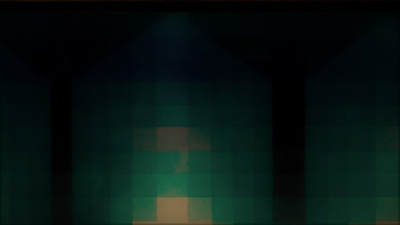
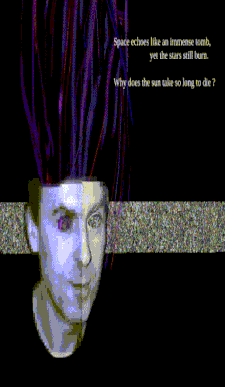
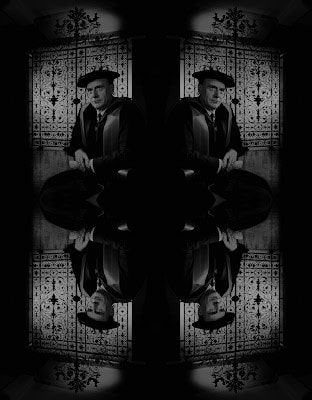
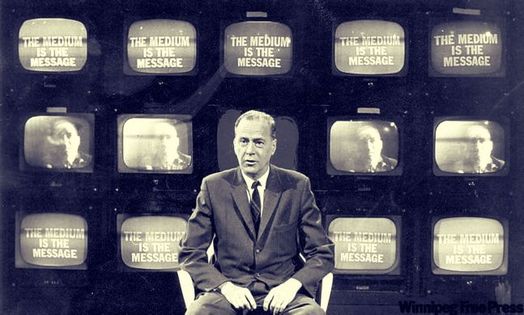

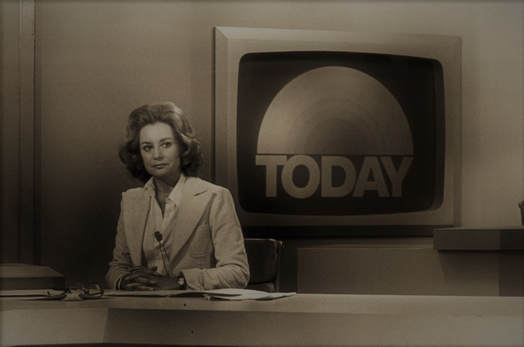
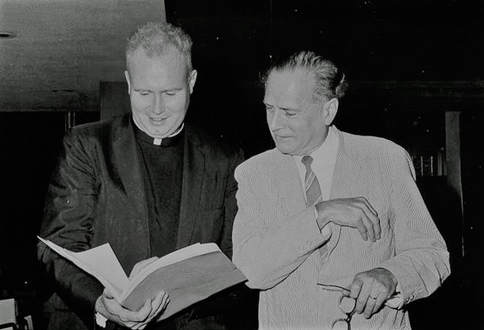
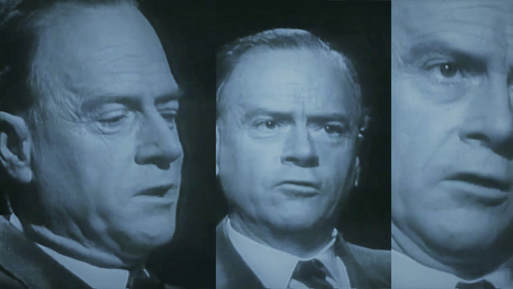
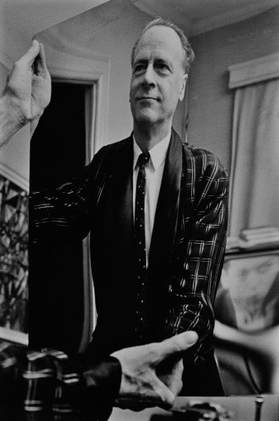

 RSS Feed
RSS Feed
